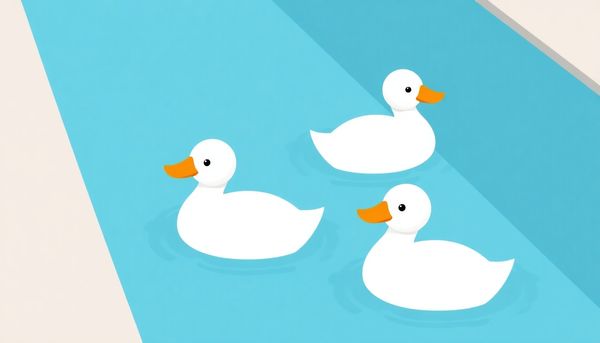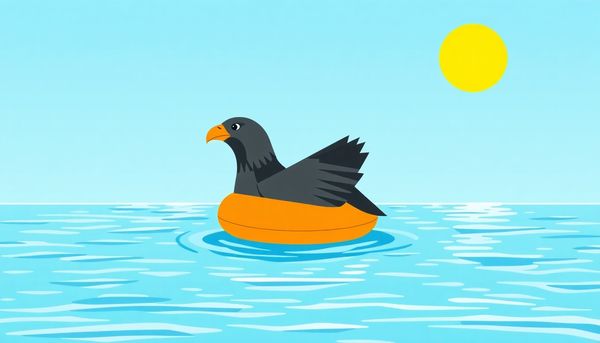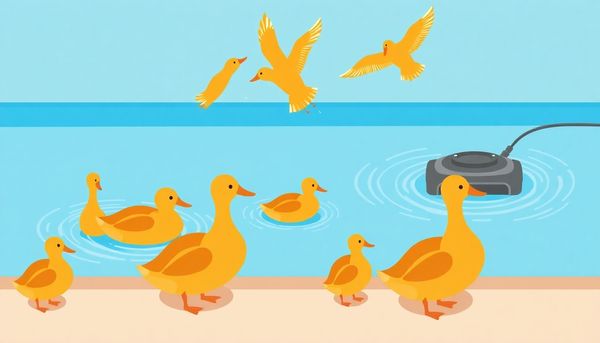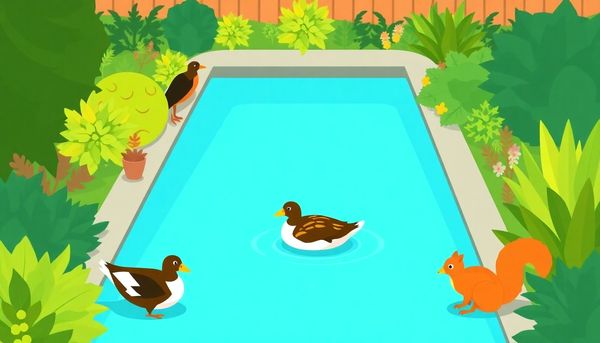Keep Ducks Out: Effective Pool Protection Tips for a Clean Swim
November 12th, 2024
November 12th, 2024
Sunlight dances over the water, casting shimmering reflections across the pool's surface. It's a serene morning, and you're ready for a refreshing swim. But as you approach, a cacophony of flapping wings and quacking pulls your attention. A family of ducks has claimed your oasis as their personal playground. Though adorable, these feathered visitors can quickly turn your pristine pool into a mess of feathers and droppings.
Many pool owners face this challenge. Ducks are naturally drawn to water, their instincts guiding them to any available pond-like structure for a dip and a nibble. While charming in appearance, their presence can lead to hygiene issues, not to mention the potential damage their webbed feet might inflict on delicate pool surfaces.
My own encounter with these aquatic invaders began one spring morning, as I watched a pair of mallards land with graceful precision. Charmed at first, I soon realized the regular visits meant constant cleaning and maintenance—an unwelcome addition to my routine. Sharing this experience with friends revealed a common plight among pool owners.
This guide will delve into effective strategies to deter ducks without causing them harm, maintaining the tranquility of your backyard retreat. From simple DIY solutions to long-term preventive measures, you'll find the tools necessary to reclaim your pool and enjoy a duck-free summer.

Imagine an unexpected ally in your mission against feathered invaders: predator-like pool toys. These inflatable guardians may seem like a whimsical addition to your aquatic setup, but their presence can be a game-changer. Ducks, as one might assume, are not fond of large, looming figures that resemble their natural enemies. An inflatable alligator or even a menacing-looking snake can make your pool look like a no-go zone for these cautious creatures.
Last summer, a friend of mine decided to give this approach a whirl after his pool became the local hangout for a flock of ducks. He invested in a couple of inflatable killer whales and watched as the ducks circled the pool, wary and cautious, before eventually flying away. It was a simple solution that turned out to be remarkably effective and even added a playful touch for the kids when they took a dip.
The trick lies in the initial placement and movement of these toys. Ensure they are strategically positioned to catch the eye from any angle a duck might approach. You might even occasionally shift them around to maintain the illusion of life. While it might not work for every duck passing by, these inflatable guardians offer a creative and humane way to keep your pool duck-free. So, why not add a bit of fun to your pool décor while safeguarding it from unwanted guests?
In the world of backyard pools, ducks are the unexpected guests that no one sends an invitation to. Yet, they arrive, blissfully unaware of the chaos they can cause. To keep these feathered freeloaders at bay, implementing effective pool-safety measures is key. Start with a pool cover; it's a simple and efficient way to deny ducks access to the water. Without the ability to land and swim, ducks are likely to seek out more hospitable waters elsewhere. Consider a solar cover, which not only deters ducks but also warms your pool and keeps debris out—multitasking at its best.
Next, introduce an element of surprise with pool toys designed to mimic predators. Inflatable alligators or snakes can unsettle ducks, making your pool seem less like a serene hangout and more like a danger zone. This playful yet strategic tactic can significantly reduce duck visits without any harm to the birds.
For those with furry friends, dogs are natural deterrents. Their presence, and a few well-timed barks, can be enough to convince ducks that your pool is not the paradise they hoped for. Remember, though, owning a pet comes with responsibilities beyond duck patrol duties.
Protecting your pool should never mean endangering wildlife. A thoughtful combination of these measures can help maintain your pool’s appeal while respecting nature's inhabitants. By creating an environment that's uninviting to ducks, you ensure a clean, safe, and serene swimming space for your family.
When your pool becomes a temporary retreat for ducks, it’s time to explore inventive deterrents that gently shoo them away without causing harm. Start by considering nature's cues: ducks are instinctively wary of predators. This can be mimicked using inflatable pool toys shaped like creatures they naturally avoid, such as alligators or snakes. Floating a few of these toys in your pool can easily trick ducks into thinking twice about landing.
Additionally, a solar pool cover offers a twofold benefit. Not only does it prevent ducks from landing, but it also maintains your pool’s temperature while keeping debris out. If budget isn’t a constraint, investing in a robotic pool cleaner could serve as an excellent deterrent. Its movement mimics the unpredictability of a predator lurking beneath the surface, a sight sure to unsettle any visiting ducks.
Lastly, if you share your home with a dog, let them play a part. Their natural curiosity and barking can be enough to send ducks flapping away. Just ensure your furry friend isn’t overly stressed by their new bird-watching duties.
Remember, the aim is to gently persuade our feathered friends to find a more suitable habitat without resorting to harm. Combining these strategies can create a less inviting environment for ducks, ensuring your pool remains a relaxing haven for family and friends instead.
Ducks are charming creatures, no doubt, but their presence in your pool isn’t just an unexpected swim party; it’s a potential health hazard. To tackle this feathery invasion, consider leveraging the innate fear of ducks: their natural predators. Back when I had a similar issue, a crafty approach involving fake predators worked wonders. I perched a few plastic owls around the pool's perimeter. These silent sentinels are well-known duck deterrents, as ducks instinctively avoid areas where owls might be lurking.
Besides owls, inflatable alligators or snakes can also serve as convincing threats. These floating guardians mimic the movement of real predators, especially when the wind catches them just right, adding an eerie realism to their presence. Just be sure to move them around every few days. Ducks are smarter than you might think and will soon realize these predators are harmless if they remain static.
Another tip: consider sound. Predator calls or ultrasonic devices that mimic the sounds of a hunting hawk can send ducks flapping in the opposite direction. It’s like having an invisible watchdog patrolling your pool, ensuring the peace and quiet remains undisturbed. With these tricks up your sleeve, your pool should soon be duck-free, allowing you to swim without the surprise of unexpected, feathered guests.

When the sun dips low and the last light dances on the water, your pool might sparkle invitingly—not just to human swimmers, but to ducks seeking a serene spot to rest. A solar pool cover could be your unexpected ally against these feathered visitors.
Think of it as a shimmering shield. A solar cover not only acts as a physical barrier, preventing ducks from landing and paddling about, but it also brings a host of other benefits. For starters, it traps solar energy, subtly warming the water beneath. This means extending your swimming season just a bit longer, without the chill of those first fall days. Moreover, it keeps debris at bay, reducing the time you spend skimming leaves or fishing out twigs.
In my own experience, using a solar pool cover transformed pool maintenance. No more hurried mornings, shooing away ducks before the kids begged to adopt them. Plus, the added perk of finding the pool consistently warmer was a delightful surprise.
Though it may appear a simple solution, a solar cover provides an effective, humane deterrent for ducks. And while you'll be safeguarding your pool's clarity and warmth, you're also gently encouraging these winged wanderers to explore other waters. Such a straightforward investment rewards with peace of mind, ensuring your pool remains a human-only haven.
A serene morning by your pool can swiftly turn into a quacking frenzy with a few uninvited feathered guests. To prevent ducks from turning your oasis into a waterfowl resort, it’s essential to disrupt their landing plans. Ducks are creatures of habit and comfort, and your pool, with its inviting water and lack of predators, seems like the perfect spot. So how can you make your pool less appealing without resorting to drastic measures?
Start by considering their approach. Ducks need a clear landing path, so break up the open space with visual deterrents. Floating objects like beach balls or inflatable predator replicas—think snakes or alligators—can make them second-guess their choice. These aren’t just decorations; they send a message that the area is not a safe haven. Similarly, installing a solar pool cover not only conserves heat and reduces debris but also creates a physical barrier that ducks can't easily penetrate.
Another option involves introducing movement. Ducks are naturally wary of anything that disrupts the water, which is why a robotic pool cleaner can serve double duty. While cleaning the pool, it mimics the movement of a lurking predator beneath the surface. For those without such a gadget, manually splashing the water whenever ducks approach can suffice.
Personal anecdotes often reveal effective, quirky solutions. A neighbor once shared how their Labrador’s playful bark kept their pool duck-free. Remember, consistency is key. With a blend of visual and physical deterrents, you can ensure your pool remains a duck-less sanctuary, allowing you to savor your peaceful retreat without the feathered fanfare.
In the quest to reclaim your watery oasis from feathered freeloaders, leveraging the warmth of your pool can be surprisingly effective. Ducks, like most creatures, are sensitive to temperature changes, and a heated pool might just be your secret weapon. By maintaining a slightly elevated water temperature, you can make your pool less appealing to our avian visitors. Ducks typically prefer cooler, natural bodies of water, and a warm pool can deter them without causing harm.
As autumn nights start to chill, consider using a solar pool cover, which not only keeps ducks at bay by denying them landing space, but also retains heat. This dual-purpose tool helps maintain an inviting atmosphere for you and your family, while subtly dissuading ducks from treating your pool as their personal pond.
From personal experience, a heated pool has another benefit: it extends the swimming season, allowing for more enjoyment during those brisk mornings or cooler evenings. Plus, the consistent warmth combined with a cover means less debris and maintenance, keeping your pool pristine without the extra effort.
For those who enjoy gadgets, investing in a pool heater timer can optimize energy use. This ensures the water is warm when you want it, without unnecessary costs. Balancing the temperature can be a strategic move, transforming your pool from a duck haven into a human haven.
A pristine pool should be a source of joy, not a nesting spot for feathered visitors. To ensure your pool remains duck-free, maintaining its cleanliness is key. Ducks are often attracted to pools due to the clarity and openness, mimicking natural water bodies they find inviting. By keeping your pool impeccably clean, you can make it less appealing to these unexpected guests.
Begin by ensuring your filtration system is in top condition. A robust filtration system not only keeps the water sparkling but also minimizes algae growth, which can attract ducks. Regularly skim leaves and debris, as ducks may see these as signs of a thriving ecosystem—perfect for foraging.
Water chemistry is another crucial factor. Ducks are less likely to linger if the chlorine levels are balanced, as a properly sanitized pool lacks the natural feel they crave. Test your water frequently, adjusting chemical levels as necessary to keep it in optimal condition.
Consider introducing subtle deterrents. For example, a floating solar pool heater not only manages your water temperature but can also create gentle ripples that discourage ducks from landing. Pair this with a robotic pool cleaner to keep the water moving, simulating an environment that's less than ideal for ducks seeking calm waters.
By prioritizing cleanliness and strategic deterrents, your pool can remain a sanctuary for you and your family—duck-free and inviting for human swimmers only.

On a bright morning, as you sip coffee by your kitchen window, an unexpected guest party might catch your eye: a group of ducks gleefully paddling around your pool. While their antics are entertaining, the aftermath of their visit isn't quite as amusing. Enter the unsung hero of the poolside world: the robotic pool cleaner. This nifty contraption does more than tidy up your aquatic playground; it also doubles as an effective duck deterrent.
The science behind this is simple. Ducks, like most animals, are wary of unexpected movement, particularly in water. As your robotic cleaner whirs to life, gliding silently beneath the surface, it becomes an intimidating presence for the feathered visitors. They sense potential danger and are likely to seek safer, calmer waters elsewhere. Picture your pool as a stage, and the robotic cleaner as a mechanical shark, its silent ballet under the water’s surface enough to send ducks fluttering away.
For those considering options, these cleaners are available for both in-ground and above-ground pools, ensuring that every backyard oasis can benefit from their dual functionality. Not only do they keep your pool sparkling clean, but they also help maintain your pool as a duck-free zone. With automated schedules, these devices allow you to rest easy, knowing your pool remains pristine and duckless. So, let the robots take charge and reclaim your pool from the quacking invaders.
A splash of activity beneath the water's surface can deter even the most curious duck. Enter the robotic pool cleaner—a mechanical marvel that not only keeps your pool sparkling but also serves as an unexpected sentry against feathered intruders. Imagine this: you’ve just settled into your favorite lounge chair, iced tea in hand, only to notice a family of ducks considering your pool their personal oasis. The sleek operation of a robotic cleaner gliding along the floor and walls of your pool creates gentle ripples that deter ducks from settling.
Robotic pool cleaners mimic the movement of underwater creatures, which instinctively makes ducks wary. These devices are programmed with precision, covering every inch of your pool, ensuring no space is left untouched by its cleaning prowess. They're a game-changer not just for hygiene but for peace of mind. When I first noticed a few ducks eyeing my pool, I decided to give a robotic cleaner a try. Not only did it eliminate unwanted debris, but the ducks soon learned that the constant motion was not part of their idyllic setting and moved on to quieter waters.
Besides keeping your pool duck-free, these cleaners boast efficiency by scrubbing and filtering without breaking a sweat (or the bank). Whether your pool is an above-ground model or an expansive in-ground retreat, there's a robotic cleaner designed to take charge, leaving the ducks to quack elsewhere.
Amusing as they might seem, ducks in your pool can become an unwanted hassle. One particularly creative way to discourage these unexpected visitors is with well-chosen pool toys, especially those mimicking predators. It’s fascinating how a simple inflatable alligator or snake can transform your tranquil pool into an intimidating no-fly zone for ducks.
At a friend’s barbecue last summer, I noticed her pool was surprisingly duck-free, despite the inviting oasis it presented. She pointed out the floating inflatable crocodile gliding ominously across the water. As if on cue, a pair of ducks fluttered by, eyeing the pool before swiftly changing course. It's not just the look of these toys but also their movement that triggers a duck's instinctual evasive maneuvers.
Moreover, these predator-like pool toys are not only functional but add a playful touch of whimsy to your backyard setup. They come in various designs, from sleek sharks to menacing alligators, ensuring your pool remains both stylish and duck-free. Plus, any wind-induced movement of the toys enhances the illusion of a lurking threat beneath the water's surface, doubly ensuring your feathery friends keep their distance.
Incorporating inflatable predator toys is a simple, cost-effective, and humane strategy that can safeguard your pool. Next time you're at the store, consider picking up one of these inflatable sentries to maintain your pool's pristine condition while adding an amusing element to your décor.
Chasing off feathered guests from your backyard oasis might seem like a quirky challenge. However, the solution doesn’t have to involve chemicals. Consider turning to nature’s own deterrents. Ducks, despite their bold presence, are quite skittish creatures. They’re easily intimidated by the unexpected or unusual, so why not take advantage of that?
A clever strategy is to introduce natural predators—well, the inflatable kind at least. A friend once told me about how a couple of inflatable crocodiles floating in her pool did wonders to keep the feathered visitors at bay. She even added a few plastic snakes on the pool edges for good measure. The ducks, it seemed, were not keen on sharing space with even the fake semblance of danger.
Reflective surfaces can also play a role in this avian deterrent game. Shiny pinwheels or strips of reflective tape strategically placed around the pool can create flashes of light that ducks find unsettling. I recall visiting a neighbor who had turned his poolside into a mini disco, minus the music, with reflective tape fluttering in the breeze. The ducks, much to his relief, had vacated the premises.
The key is to think creatively and empathetically. After all, a pool can be a temporary stopover for our web-footed friends, but with a bit of ingenuity, you can ensure it doesn’t become their favorite hangout.

When it comes to warding off uninvited avian guests, employing safe chemical solutions can be a gentle yet effective approach. There’s an eco-friendly product on the market known as Duck Off, crafted to disrupt the surface tension of water. This change makes it uncomfortable for ducks to float, encouraging them to seek other water sources. The beauty of this solution lies in its subtlety; it doesn’t harm the ducks, merely nudges them away.
In my own experience, balancing pool maintenance with wildlife conservation can be a tricky dance. Last summer, after trying various methods without success, I gave Duck Off a whirl. Not only did it prevent ducks from settling in, but it also didn’t interfere with the pool’s chemical balance or my family’s swimming enjoyment. The ducks quickly found another spot to call home, leaving our pool blissfully feather-free.
Using safe chemical options requires some caution. Ensure pool water levels are suitable for human swimmers and follow product guidelines to avoid overuse. Also, remember this should be a last resort. Exploring non-chemical alternatives first can ensure your pool remains a wildlife-friendly zone without compromising its cleanliness or your enjoyment. In the end, it’s about creating an environment that respects both human and animal needs.
Ever wake up to an unexpected pool party starring a crew of quacking ducks? While the kids might be entertained, keeping our feathered friends at bay is crucial for everyone's well-being. One effective strategy is ensuring your pool's perimeter is as secure as Fort Knox, albeit less imposing.
Start by assessing the existing barriers around your pool. A well-maintained fence is not just for keeping children safe—it can also deter ducks. Opt for a fence that doesn't have gaps large enough for a duck to waddle through. You might think ducks can only fly over barriers, but they often walk right in if given the chance.
Consider the addition of netting over the pool during off-peak hours. This method acts as both a physical and visual deterrent. Ducks, like many birds, tend to avoid obstacles in their flight paths. A reliable net can work wonders, creating an uninviting environment for them without harming or stressing the birds.
Lastly, if your pool area is surrounded by greenery, make sure to keep it trimmed and tidy. Ducks are attracted to lush vegetation as it provides cover and a possible food source. Reducing these cozy spots makes the area less attractive to them.
Creating a water-tight barrier around your pool isn’t just about fences and nets; it’s about making the whole environment less appealing to visiting ducks. By doing so, you protect both your family and the ducks, ensuring everyone enjoys their respective spaces safely.
Deploying predator-like pool decoys is a clever strategy to deter ducks from treating your pool as their personal oasis. While ducks might find your pool a safe retreat, introducing a touch of fear via these decoys can gently remind them that they’re not exactly welcome. Inflatable replicas of natural duck predators such as alligators, owls, or snakes can be particularly effective. When these lifelike figures float or perch around your pool, they serve as a visual deterrent, signaling potential danger to any feathered visitors.
I remember my neighbor swearing by this method. Faced with a persistent pair of mallards that seemed to consider his pool their favorite hangout, he invested in a couple of inflatable crocodiles. After strategically placing them in the pool, the ducks decided it was time to relocate. The decoys, with their glistening eyes and realistic texture, were enough to convince the birds that this was no longer a five-star resort.
Incorporating these decoys into your pool's setup is not only effective but can also add a quirky, playful element to your backyard aesthetic. Just ensure you move them occasionally, as ducks can be surprisingly quick to realize when a threat is nothing more than a harmless float. By varying their positions, you maintain the illusion of lurking predators, keeping your pool duck-free and your water pristine.
One evening, while recounting tales of suburban adventures with a friend, the topic of pool invaders came up. It turns out, ducks have a knack for transforming serene pools into bustling avian hangouts. Yet, addressing this issue with caution and care for the environment is crucial. Opt for safe chemical alternatives, which can effectively keep ducks at bay without harming them or the ecosystem.
Firstly, explore natural deterrents like essential oils. Ducks, much like people, have a keen sense of smell and certain fragrances can be off-putting. Citrus or peppermint oils can be diluted and sprayed around the pool area. Such scents are unpleasant to our feathered friends but delightful and refreshing for human noses.
Consider the benefits of vinegar—an affordable, natural solution. Mixing vinegar with water and spraying it around the pool can create an environment that ducks find less inviting. This method deters without causing any harm, maintaining a safe and friendly backyard atmosphere.
If natural oils or vinegar seem too unconventional, a gentle non-toxic commercial product might suit your needs. Look for brands that pride themselves on eco-friendliness and are specifically designed for repelling birds. These solutions reduce the likelihood of ducks returning without posing a risk to them or other backyard visitors.
Ultimately, the goal is to shape an environment that naturally encourages ducks to find more suitable habitats, ensuring your pool remains pristine and inviting for human enjoyment.

Amidst the challenge of keeping your pool a duck-free zone, nature itself offers some elegant solutions. One morning, I noticed a neighbor's garden brimming with native plants, attracting a symphony of local wildlife—except the ducks. This inspired an idea: harness the power of natural deterrents. By cultivating certain plants and creating an environment less appealing to ducks, you can discourage their visits without much hassle.
Native plants, especially those with strong scents or thorny textures, can be strategically placed around the pool area. Plants like lavender or rosemary not only add a lovely aroma but also act as a natural duck repellent. Ducks tend to avoid areas where they can’t easily navigate or access water, so incorporating tall grasses or shrubs can obstruct their path and make your pool less inviting.
Consider also natural predators of ducks, such as owls or hawks. Of course, releasing these animals into your backyard isn’t practical or ethical, but you can deploy clever decoys. Statues or even recorded predator calls can add another layer of deterrence. It's a bit like crafting a garden that politely says, "Not here, ducks."
In essence, by embracing natural deterrents, you not only keep your pool pristine but also create a vibrant ecosystem in your backyard. It’s a harmonious balance where your family can swim undisturbed, and the wildlife can flourish, just not in your pool.
A shimmering pool, inviting under the sun, can quickly become a duck’s personal oasis if precautions aren’t taken. One effective method to maintain your pool’s avian-free status lies in the strategic deployment of pool covers. Think of a pool cover as a barrier, not only safeguarding the water beneath from debris but also acting as a deterrent for our feathered friends. Ducks, ever wary of their landing spots, will think twice before attempting to alight on a surface they can’t clearly see or access.
Using a solar pool cover, for example, offers a dual benefit. Not only does it deter ducks by obscuring their view of the water, but it also cleverly traps heat, making your pool more energy-efficient. On a personal note, I once wrestled with the task of keeping ducks away from my pool. A solar pool cover transformed my dilemma, eliminating the troublesome visits without compromising the water's warmth or cleanliness.
Moreover, deploying a pool cover is as much about timing as it is about choice. Consider rolling it out during peak duck activity times—typically early morning and late afternoon. This simple yet strategic step can significantly reduce the likelihood of ducks making your pool their pit stop. In doing so, you're not only preserving the sanctity of your swimming space but also contributing to a safer environment for the ducks, preventing any unwanted close encounters with pool chemicals.
Robotic pool cleaners have become unsung heroes in the quest to keep ducks at bay. Their silent, efficient movements mimic the presence of something lurking underwater, which is enough to give our feathered friends second thoughts about making your pool their new hangout spot. Imagine the surprise on a duck's face when the serene water suddenly ripples with the activity of a mechanical intruder.
Having personally witnessed their effectiveness, I can vouch for the uncanny ability of these machines to deter feathered visitors. My neighbor, for instance, invested in a sleek robotic cleaner, and within days, the once regular duck gatherings by his pool had dwindled. It seems the constant, unpredictable movement was unsettling enough to convince the ducks that perhaps the pond down the road was a more suitable habitat.
These devices are a breeze to operate, often requiring only a simple setup and occasional maintenance. And beyond their duck-repelling prowess, they dutifully scrub your pool, ensuring it's always ready for a spontaneous swim. By integrating them into your regular pool care routine, not only do you keep the ducks at bay, but you also maintain a sparkling oasis for your family. Whether you opt for a model with remote control or one with a programmable schedule, robotic cleaners provide a practical, non-invasive solution that keeps your pool duck-free and pristine.

This article provided insights into maintaining your pool. Start your pool care journey today!
Want to become a pool maintenance expert? Our free Pool School course covers everything you need to know about pool care. From basic maintenance to advanced troubleshooting, you'll learn how to:
Join over 10,000 pool owners who have already transformed their pool care routine. Get started with our free Pool School course today!